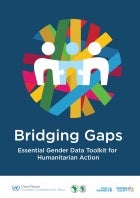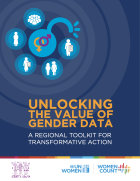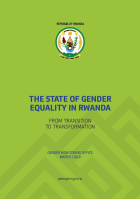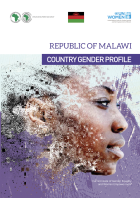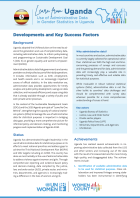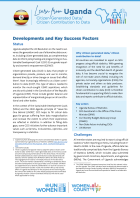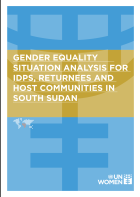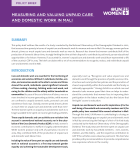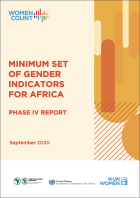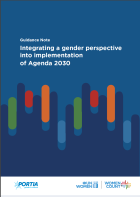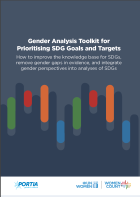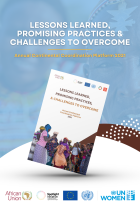1 - 20 of 32 Results
Pagination
Date:
This toolkit is aimed at providing an easily accessible compendium of resources available for the production and use of gender data in humanitarian settings. It is tailored to build capacity and provide guidance to governments, civil society organizations (CSO), humanitarians working with data, information managers, managers, decision makers, statisticians, and users of gender statistics. The contained tools can be used in support of key humanitarian planning and operational processes, including advocacy, strategy and policy formulation, planning, resource allocation, monitoring, and evaluation.
Date:
Ethiopia has demonstrated thought leadership in the use of gender data to meet national priorities and address gaps to achieve these as well as SDG targets on gender equality and women’s empowerment (GEWE) and others. Gender data has notably been used to improve and safeguard education opportunities for girls, boost agriculture and productivity, particularly for female-headed households including through addressing land ownership, and to address issues of gender-biased violence.
Date:
This Toolkit is designed to support the enhanced use of existing gender data and statistics in policy, advocacy, planning, and accountability in East and Southern Africa. The production and use of gender statistics is a complex process that requires deliberate efforts to connect, incentivize, and influence.The strategies outlined provide guidance and user-friendly tips on how to influence, direct, and monitor the pace of progress towards achieving gender equality and women’s economic empowerment and using gender data and statistics.
Date:
This product is related to the Be Like Tanzania series and part of an ongoing regional study. The study aims to showcase developments, achievements and lessons in the uptake and use of gender data and statistics in East and Southern Africa as part of experience-sharing and particularly south-south learning towards promoting the communication and use of gender data and statistics for policy- and decision-making to improve the lives of women and girls.
Date:
The Burundi Country Gender Equality Profile (CGEP), 2023 edition scans the horizons and outlines the prospects for gender equality in Burundi with a view to creating an overview and establishing a baseline on the situation of Gender Equality in the country.
Date:
This Report presents the Africa Shared Research Agenda (ASRA) for ending gender-based violence (GBV), which was developed though a collaboration between UN Women Africa and the Sexual Violence Research Initiative. The ASRA is a set of research priorities for the field, developed through a participatory and consultative process and aims to inform investments in research over the coming 5-10 years for ending GBV in Central, East, Southern and West Africa.
Date:
The disproportionate burden of unpaid care and domestic work on women can significantly limit their ability to engage in productive activities or participate in public life and even contribute to the feminization of poverty. The new data is important for accurately measuring the household production of goods and services and their contribution to the national economy.
Date:
This publication highlights the progress and prevailing gender gaps in Rwanda so far as far as Gender Equality and Women's Empowerment is concerned. It also gives insights into the state of gender equality in the National Strategy for Transformation (NST1) pillars.
Date:
The Malawi Counrty Gender Profile publication presents a review of existing gender issues identified through a review of documents and reports recently released. The generic purpose of Country Gender Profile is to strengthen national understanding and data on the advancement of international, regional and national commitments towards Gender Equality and Women's Empowerment.
Date:
This Policy Brief will explore the results of the mapping of the women’s movement, and the weaknesses, strengths and recommendations of the current civil-society movement as identified during the National Forum and analysis of the mapping.
Date:
Uganda has demonstrated thought leadership in the use of administrative data for statistical purposes in its efforts to meet national priorities and address gaps to achieve the Third National Development Plan (NDPIII) and SDG targets including on gender equality and women’s empowerment. This brief highlights some of Uganda’s achievements and lessons in improving the quality and use of this data to address violence against women and girls (VAWG).
Date:
Uganda's the national statistical system (NSS) has sought to respond effectively to the surge in demand for gender data by using existing legal infrastructure, coordination mechanisms, and statistical and data development strategies to increase the available data. One of these steps is the development of citizen-generated data (CGD)−now more accurately referred to as citizen contribution to data (CCD). Several achievements and lessons from this move are highlighted in this brief.
Date:
As gaps remain in efforts to stem the tide of global economic crises, having fiscal policies in place to safeguard spending for women is essential. Gender Responsive Budgeting (GRB) can ensure a gender-equitable allocation of resources and expenditure tracking to promote gender equality. This briefing note provides information on the foundation established to determine entry points for this work, key partnerships, and plans to advance systemic financing for gender equality in the country.
Date:
This policy brief outlines the results of a study conducted by the National Observatory of the Demographic Dividend in 2022, that assesses time poverty in terms of unpaid care and domestic work in Mali. Research showed that women contribute 80% of the
production of domestic labour time, strongly limiting the time at their disposal for paid work and educational opportunities. If accounted for, women’s unpaid care would represent 17.6% of the country’s GDP (2019).
Date:
This edition of our quarterly publication, aimed at keeping our esteemed readers abreast with the endeavors of UN Women Uganda, encompasses the period of October through December 2022. Within these pages, we have meticulously curated a selection of activities undertaken by our organization, as well as providing a platform for the voices of those whom we have had the privilege of serving, to be heard. We trust that the contents of this newsletter will prove to be both enlightening and informative. Enjoy the read!
Date:
There is a tendency to view the sheer volume of land certificates issued in Ethiopia in recent years as a proxy for improvements in women’s land tenure security. While getting land registered in women’s names is a significant step, evidence indicates that focusing on titling alone may not necessarily lead to greater tenure security for women.
Control and transfer rights of land for women are affected by broader gendered norms and practices. It is high time to think more deeply around the post-certification agenda so that women can derive the full range of benefits from their land resources.
Date:
The purpose of the Global Minimum Set of Gender Indicators is to develop a common statistical measurement framework that could be used for the national production and international compilation of gender statistics and to track progress across countries and regions.
Date:
This study explains why it is important to integrate a gender perspective into assessments of all the SDGs, and also shows how to approach this task as a way to enhance gender mainstreaming across the 2030 Agenda.
Date:
Consistent integration of a gender perspective into each SDG requires that the methodological approaches used to analyse targets should be capable of identifying gender inequality concerns in the ‘gender silent’ targets and when mapping interlinkages between them. Ths toolkit adresses sustinability issues by providing SDG researchers, analysts, and policy experts with the necessary tools to incorporate gender considerations throughout their Agenda 2030 related work.
Date:
The report “Lessons Learned, Promising Practices, & Challenges to Overcome” provides first-hand experiences from the eight African countries implementing the Spotlight Initiative in ending violence against women and girls.

